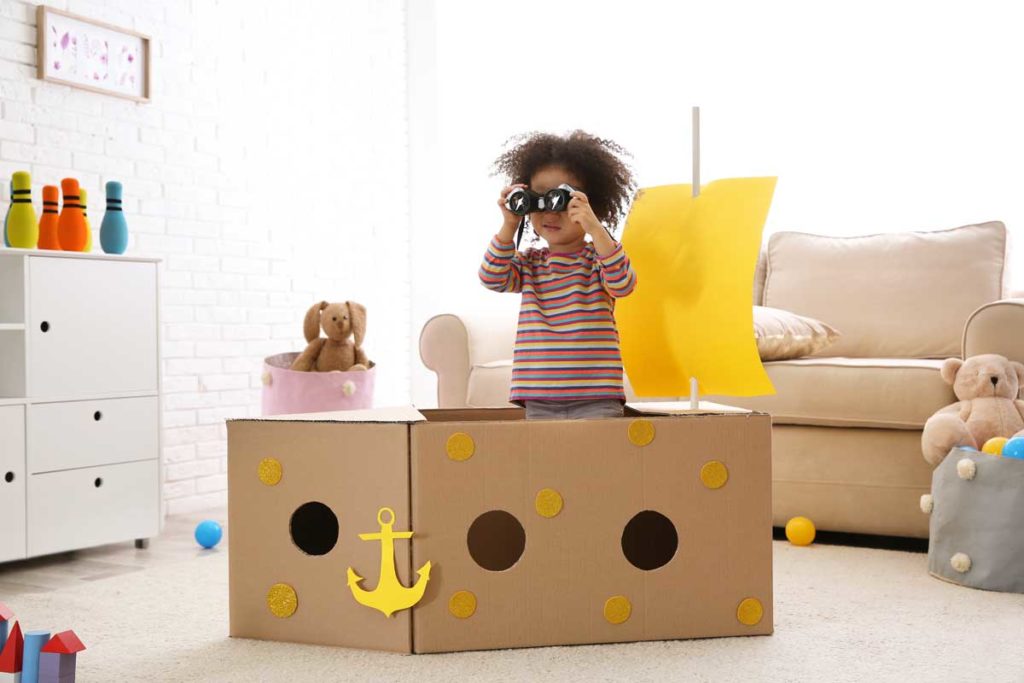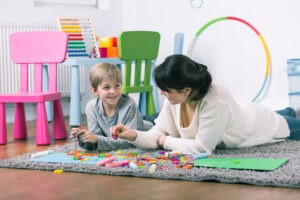Cook up a delicious meal, perform a check up on your puppy, plant a garden, and heal a sick patient. It’s all in a day’s work for your child when he or she participates in imaginative play at home!
Not only is playing pretend a fun and engaging way for children to use toys, but it’s been proven to have countless benefits on their language, cognitive, and social-emotional development. Investing in toys that promote imaginative play is well worth it since research has shown that children typically play this way from 18 months all the way up to 11 years old. Here are some of the best toys on the market from Learning Resources for encouraging your child’s imagination to run wild at all ages!
18 Months: The Language Learner
What might just look like a tower of blocks to a parent can be a gumball machine, airplane, or a zoo in their child’s eyes. Between 12 to 18 months, your little one starts understanding that one thing can symbolize another (Weitzman and Greenberg, 2002). Not only toys, but words! They learn that words can represent their thoughts or names of objects and they start developing language. Improve your child’s vocabulary through imaginative play with these toys:
Grow your child’s imagination and pretend flowers and veggies with this little garden set. To boost your tiny gardener’s vocabulary, use simple sentences to talk out loud about the objects such as flower, carrot, water, pot, and shovel as you point to them.
Where’s my lunch? Develop your child’s language comprehension and ability to follow directions by pretending you are each a customer or the cook! Asking him or her to find different objects or colors as you prepare the meal together is a fun way to incorporate language learning into this activity.
2 Years: Toddlers Who Talk Action
Sleeping, flying, cooking – pretend play is full of action! Teach your toddler to add verbs to his or her vocabulary by modeling them as you play. Narrate what you are doing and what you observe your child doing, such as, “Nice stirring!”.
Has your child watched in amazement as you repaired the sink or changed the batteries in a toy? Then they’ll love using this tool kit to “fix” things around the house that you ask them to as you encourage them to describe their actions such as cutting, twisting, and drilling!
3 to 4 Years: Independent Thinker
By this age, children learn to follow others’ cues and become more independent in how they imitate everyday activities they’ve seen. They’ll even start to pretend about things they may have never actually experienced, like taking a rocketship to the moon or going camping! Encourage your child’s independence by becoming involved and role-playing along with your child, while talking to him or her at eye-level to show your interest.
Make a fort in your living room and expose your child to what may be a new experience – a campout! Let your child’s independence shine as you follow his or her lead while playing.
Imaginative play is a fun, easy way to develop your child’s social-emotional skills such as empathy (the ability to understand and share the feelings of another). Pretend play as doctor and patient will encourage your child to watch your facial expressions, body language, and listen to your words to understand what feelings they convey and how they should respond!
5 to 7 Years: The Problem Solver
Through imagined play, you can help your child learn to use cognitive skills such as problem-solving! Talk things through with him or her during play and give choices of possible solutions to problems. Turn-taking is a social skill that does not develop naturally but can be practiced during play. This teaches your child to take someone else’s person’s point of view and apply self-regulation skills such as patience.
Take turns with your child as you care for a puppy together. Come up with possible problems (“oh no, he’s whining. What could be wrong?”) and collaborate to problem solve!
8 Years and Up: Super Sequencer
That’s right, even children at this age can benefit from engaging in imaginative play! Besides continuing to develop their social skills, it can be a fun, hands-on way to enhance some auditory processing skills.
Challenge your child’s memory and sequencing skills by ordering sandwiches with a number of different ingredients (turkey, cheese, tomatoes, and lettuce, for example). Teach your child strategies such as asking for repetitions when needed and reciting the words back to themselves to help them remember.
Imaginative play is a great way to ignite your child’s language, cognitive, and social-emotional development! If you have concerns with these areas, consider consulting an expert. TherapyWorks is a company that provides remote Speech Therapy and Social Work services with licensed professionals that can evaluate your child and, if indicated, provide assistance.
References:
Weitzman, E. Greenberg, J. 2002. Learning Language and Loving It: A guide to promoting children’s social, language, and literacy development in early childhood settings. Toronto: The Hanen Centre.








